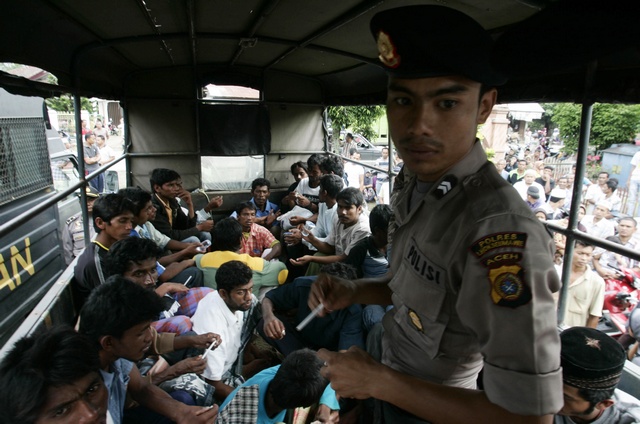The Burmese government continues to systematically discriminate against the Muslim Rohingya minority in western Burma by denying them humanitarian aid and isolating them in “long-term” camps or ghettos, a leading human rights group warned on Wednesday.
Human Rights Watch (HRW) accused the regime of fuelling a devastating humanitarian crisis among the stateless Rohingya by leaving them to linger in “squalid” camps without access to food, healthcare or livelihoods in the run-up to the rainy season.
“Burma’s leaders seem intent on keeping the Rohingya segregated in camps rather than planning for them to return to their homes,” said Phil Robertson, deputy Asia director at Human Rights Watch, adding that there is a real risk of camps becoming “permanent”.
Rohingya Muslims and Buddhists have been kept segregated, since two bouts of vicious ethno-religious clashes in June and October last year, which killed at least 200 people and displaced more than 125,000. Rohingya Muslims are considered illegal Bengali immigrants by the government and denied citizenship.
Security forces were accused of siding with the Buddhist Arakanese in the violence and Robertson insists the government continues to be “untroubled” by the plight of displaced Muslims and “will be responsible for the lives unnecessarily lost”.
The distribution of humanitarian aid continues to be severely hampered by local hostility and government inertia. According to HRW, tens of thousands of Rohingyas have still not been registered as internally displaced persons (IDPs) by authorities, leaving them particularly vulnerable to malnutrition, disease and death.
“The government has failed to register large numbers of Rohingya in many IDP camps, so these people are effectively ineligible for any sort of assistance,” Robertson told DVB, citing information from camp registrars, including government officials and local village headmen.
“Everyone knows where they are, they are still being surrounded and guarded by security forces but they are not being helped.”
HRW’s findings are supported by local aid workers, who recently told DVB that thousands of Rohingyas face starvation, unless the government takes swift action to improve humanitarian access.
“Many people are dying from the blockade of aid,” Oddny Gumaer from Partners Relief and Development reported in January. “If they are not registered, they don’t get any food. These people must resort to begging.”
Thousands of locals, who did not lose their homes in last year’s violence, have also warned of an escalating crisis as they do not qualify for aid, but cannot earn a living.
Sittwe’s Muslim quarter, Aung Mingalar, which is home to some 7,000 people, has been cordoned off by police since June and residents who venture outside risk being arrested or beaten.
“We only want permission to bring food from outside to Aung Mingalar,” a local from Sittwe’s Muslim quarter told HRW.
It echoes reports by numerous Muslims, who spoke to DVB on a visit to Sittwe in December, which suggest that their community’s health and livelihoods have been destroyed by the government’s policy of segregation.
“We hardly have any food provisions,” Mohammed Rafi from Aung Mingalar told DVB. “We don’t even have any doctors to cure us when we are ill. Nor are we allowed to go outside for treatment.”
The Rohingya have been described as one of the world’s most persecuted minorities by the UN and have lived in limbo along the border with neighbouring Bangladesh since 1982, when former military dictator Ne Win stripped them of their Burmese citizenship.
The government claims that segregation aims to protect both communities, yet Buddhists and Hindus are able to travel freely. Even Kaman Muslims, who are Burmese citizens, but share cultural commonalities with the Rohingya community, are forbidden from travelling.
Since last year’s violence in Arakan state, anti-Muslim sentiments have continued to spread across Burma. Over the past week, a wave of attacks on Muslims has rippled through the country, resulting in at least 40 deaths and the destruction of thousands of homes and several mosques across the Mandalay region and Pegu division.
“The unfortunate lesson from the violence in Arakan State is that so far the government does little to hold accountable those who violate the rights of Muslims in Burma,” Robertson said. “By failing to stop violence and prosecute those who incite it, the country’s leaders are failing the test of reform.”
The government declined to comment.



